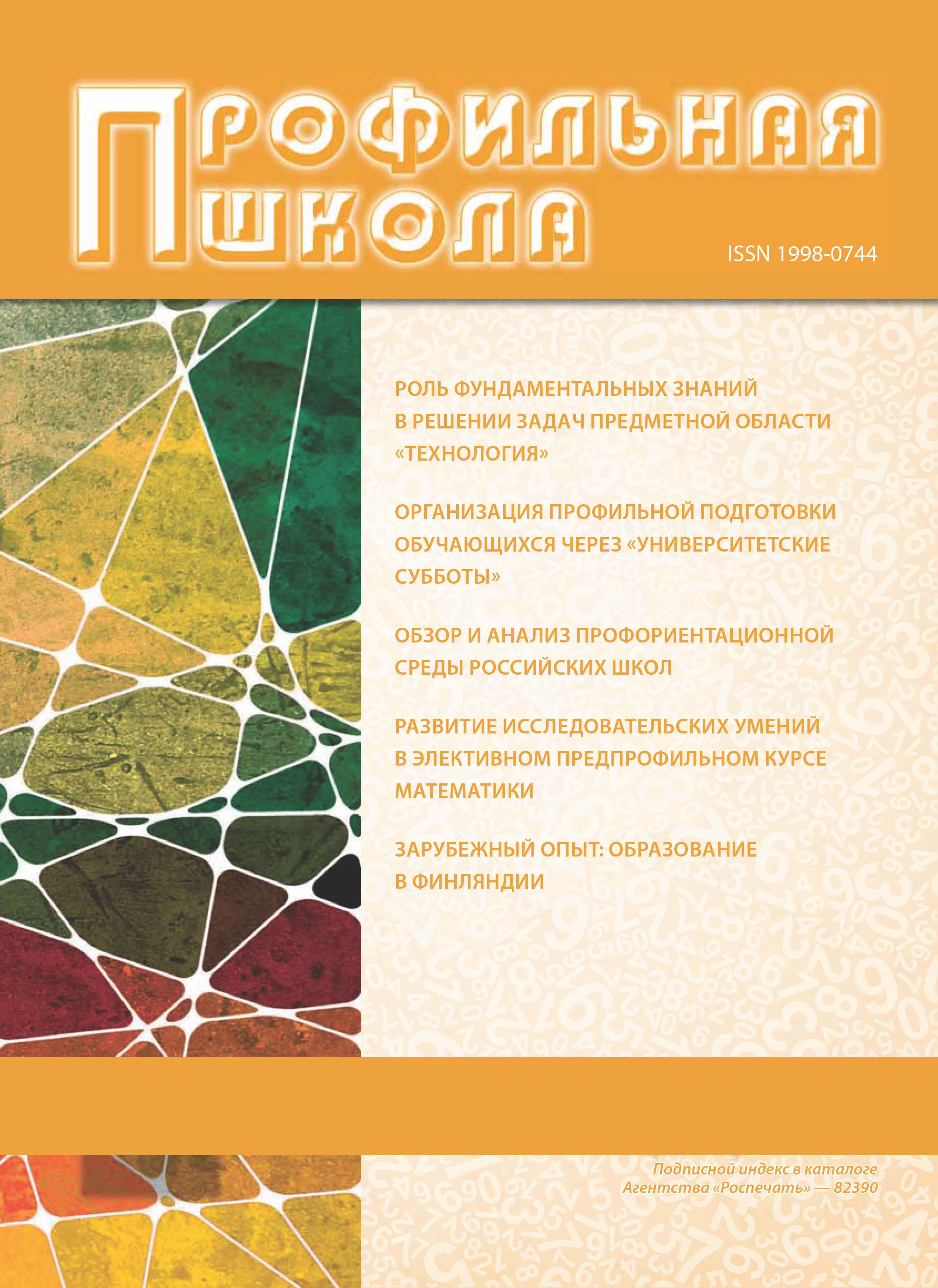Russian Federation
The research is devoted to the study of the problem of organizing personalized training of teachers in digital technologies in the system of post-diploma teacher education in online format. The paper describes an approach to designing an organizational learning model that provides a set of flexible and practice-oriented educational programs.
digital competence of the teacher, personalized training, individual style of activity, competence model of professional development
1. Nacional'nyj proekt «Obrazovanie» [National project "Education"]. Min-prosveshhenie Rossii [Ministry of Education of Russia]. Available at: https://edu.gov.ru/national-project (accessed 10 July 2020).
2. Pis'mo Minobrnauki Rossii ot 09.10.2013 № 06-735 «O dopolnitel'-nom professional'nom obrazovanii» (vmeste s «Raz#jasnenijami o zakonodatel'-nom i normativnom pravovom obespechenii dopolnitel'nogo professional'nogo obrazovanija») [Letter of the Ministry of Education and Science of Russia dated 09.10.2013 No. 06-735 "On additional vocational education" (together with "Clarifications on the legislative and regulatory legal support for additional vocational education")]. SPS «Konsul'tantPljus» [ATP "ConsultantPlus"]. Available at: www.consultant.ru (accessed 12 July 2020).
3. Prohorov A., Konik L. Cifrovaja transformacija. Analiz, trendy, mirovoj opyt [Digital transformation. Analysis, trends, world experience]. Moscow: «Al'jansPrint» Publ., 2019. 368 p.
4. Programma «Cifrovaja jekonomika Rossijskoj Federacii»: Rasporja-zhenie Pravitel'stva RF ot 28 ijulja 2017 goda №1632-r. [Program "Digital Economy of the Russian Federation": Order of the Government of the Russian Federation dated July 28, 2017 No. 1632-r]. SPS «Garant» [SPS "Garant"]. Available at: http://gov.garant.ru/SESSION/PILOT/main.htm (accessed 12 July 2020).
5. Brol'pito Alessandro. Cifrovye navyki i kompetencija, cifrovoe i onlajn obuchenie Evropejskij fond obrazovanija, Turin, 2019 [Digital skills and competence, digital and online learning European Education Foundation, Turin, 2019]. ETF [ETF]. Available at: https://www.etf.europa.eu/sites/default/files/2019-08/dsc_and_dol_ru_0.pdf (accessed 12 July 2020).
6. Proposal for a European Framework for the Digital Competence of Educators (DigCompEdu) / Assessing Educators' Digital Competence [Jelektronnyj resurs] // European Commission Available at: https://ec.europa.eu/jrc/sites/jrcsh/files/digcompedu_overview_-_english.pdf (accessed 12 July 2020).
7. Didgital Age Learning. EMFD Special Interest Group Report [Jelektronnyj resurs] // EMFD Available at: https://efmdglobal.org/wp-content/uploads/5a_SIG_DAL_Report.pdf (accessed 12 July 2020).
8. ECDL Foundation. Vozmozhnost' professional'nogo ispol'zovanija IKT rabotodateljami, individual'nymi licami, organizacijami i obshhestvom [ECDL Foundation. Possibility of professional use of ICT by employers, individuals, organizations and society]. RosNOU [RosNOU]. Available at: https://www.rosnou.ru/pub/0002014/useful/Russian-Brochure.pdf (accessed 12 July 2020).
9. Ob utverzhdenii osnovnyh principov nacional'noj sistemy profes-sional'nogo rosta pedagogicheskih rabotnikov Rossijskoj Federacii, vkljuchaja nacion-al'nuju sistemu uchitel'skogo rosta. Rasporjazhenie Pravitel'stva RF ot 31 dekabrja 2019 goda № 3273-r. [On the approval of the basic principles of the national system of professional growth of teachers in the Russian Federation, including the national system of teacher growth. Order of the Government of the Russian Federation of December 31, 2019 No. 3273-r].
10. A.Ju. Uvarov, S. Van, C. Kan Problemy i perspektivy cifrovoj transformacii obrazovanija v Rossii i Kitae [Problems and prospects of digital transformation of education in Russia and China]. Rossijsko-kitajskaja konferencija issledovatelej obrazovanija «Cifrovaja transformacija obrazovanija i iskusstvennyj intellekt». Moskva, Rossija, 26-27 sentjabrja 2019 g. [Russian-Chinese conference of educational researchers “Digital transformation of education and artificial intelligence”. Moscow, Russia, September 26-27, 2019]. Moscow: Vysshaya shkola jekonomiki Publ., 2019. 155 p.
11. Personalized Learning: A New ICTEnabled Education Approach. Policy Brief, 2013 [Jelektronnyj resurs] // UNESCO Institute for Information Technologies in Education. Available at: https://iite.unesco.org/pics/publications/en/files/3214716.pdf (accessed 12 July 2020).
12. Chvanova M.S., Filatova K.V. Uslovija i mehanizmy formirovanija in-dividual'nogo stilja dejatel'nosti studenta-dizajnera [Conditions and mechanisms for the formation of an individual style of activity of a student-designer]. Vestnik Tambovskogo gosudarstvennogo universiteta [Bulletin of the Tambov State University]. 2012, I. 4(108), pp. 154-159.
13. Klimov E.A. Individual'nyj stil' dejatel'nosti [Individual style of activity]. Psihologija indi-vidual'nyh razlichij [Psychology of individual differences]. Moscow: AST, Astrel' Publ., 2008, pp. 265-268.
14. Ajmaletdinov T.A., Baj-muratova L.R., Zajceva O.A., Imaeva G.R. Cifrovaja gramotnost' rossijskih pedagogov. Gotovnost' k ispol'zo-vaniju cifrovyh tehnologij v uchebnom processe [Digital literacy of Russian teachers. Readiness to use digital technologies in the educational process]. Analiticheskij centr NAFI [NAFI Analytical Center]. Moscow: NAFI Publ., 2019. 88 p.






